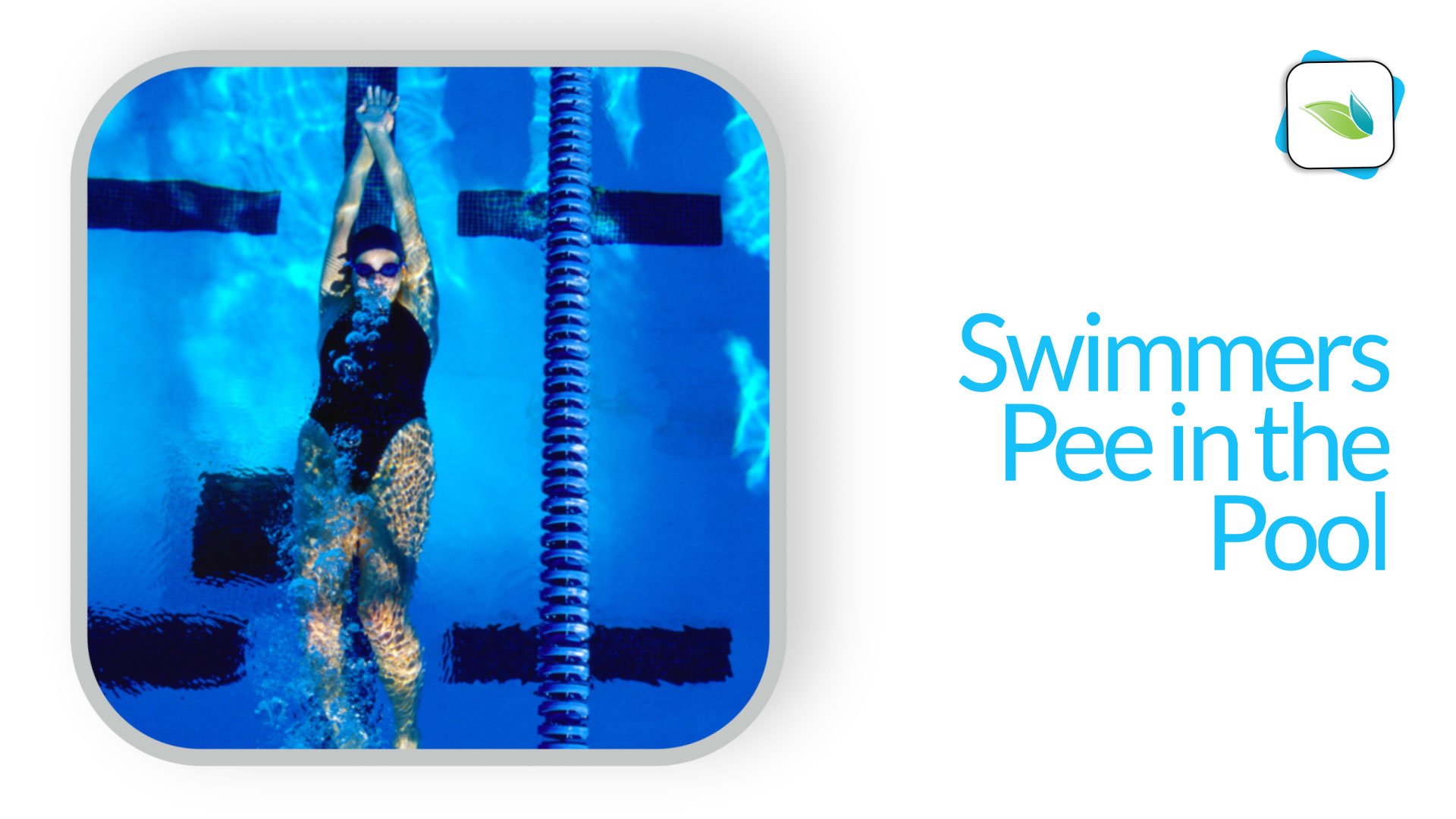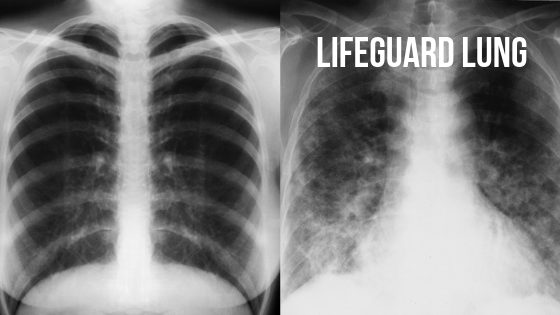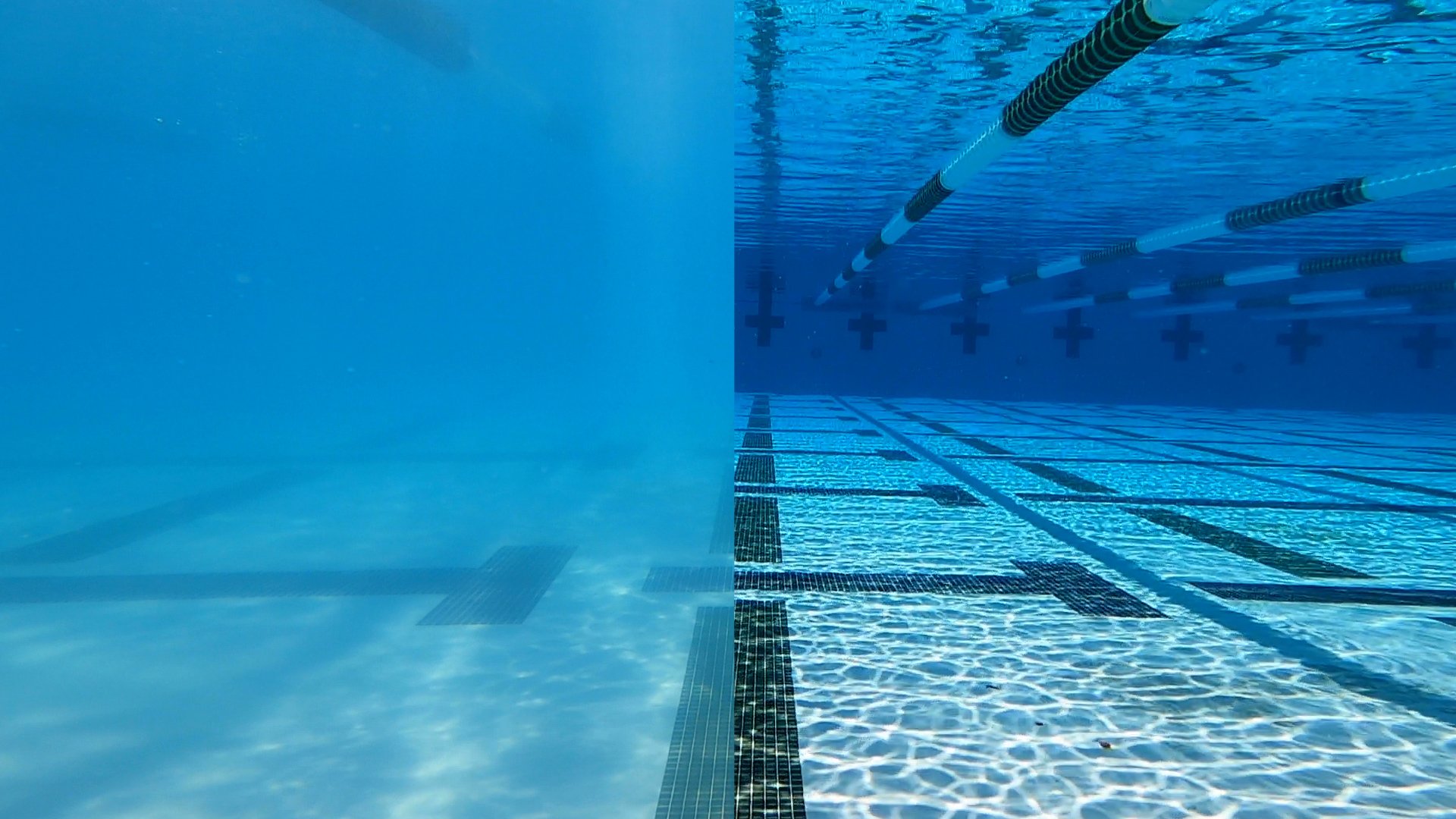Swimmers Pee in the Pool

Swimmers pee in the pool
Not only is peeing in the pool disgusting, it also results in harmful disinfectant byproducts (DBPs) being off-gassed from the water. Examples of these DBPs are chloramines (specifically the airborne NCl3, Nitrogen Trichloride), chloroform, cyanogen chloride, and other gases. They are harmful and cause swimmers like me to develop asthma and lifeguard lung. Ironically, our urine is one of the root causes of the harmful air we breathe. One would think that would be enough to stop swimmers from peeing in the pool. But there are valid reasons why swimmers pee.
A splash of reality

Here's a harsh reality: swimmers pee in the pool, and they will continue to do so. We in the aquatics industry must accept that, and act accordingly. No more pointing fingers and talking down to swimmers like "if you would just (insert demand about not peeing here), everything would be fine." It falls upon deaf ears.
As a swimmer, I suggest we all grasp reality, and not make chastising swimmers our primary strategy.
My stance puts me at odds with "the experts" at USA Swimming, the CDC, and other leading organizations that have professional opinions on the matter. That's okay. I'm not here to agree with the experts, I'm here to tell you the truth, even though it's unpopular. For what it's worth, I agree with them–we should not pee in the pool. I'm just saying that's unrealistic. The fact is, swimming culture would have to change for the problem to stop. And the economics of the sport would also have to change, allowing for more time in the water.
Urine deep water here, folks
I know the science behind it all, and the health consequences of swimmers' urine mixing into the pool water. But guess what? Most swimmers either don't know, don't care, or both. The disconnect is one of swimming culture, and where our priorities are.
Related: What are Chloramines?
Scenario 1: Practice
It's a hard practice. You've finished your 1200-yard warmup, and you're holding on the wall with your teammates, waiting for your coach to give the first set. Staying hydrated is critical in sports, and especially in swimming. We lose a tremendous amount of sweat while swimming, even though we don't notice. It's easy to get dehydrated, fast. Drink up.
The first set is 12x100 IM's, mixing in drills and kick. It takes about 20 minutes to complete, and now you have to pee. Given the extra pressure of your bladder being underwater, time's a factor, because the main set is about to begin. You can either run to the bathroom to pee and miss the explanation of the set (not to mention, it's freezing in the bathroom when you're soaking wet), or stick around.
Most of us stick around.
No swimmer wants to be "that teammate" who jumps out in the middle of a set and loses their heart rate that everyone else is pushing through. That's cheap. That's like leaving on the :07. And swimmers know what I'm talking about. Those who leave on the :07 deserve nobody's respect. They're down there with Save-up Sally and Warm-up Sprinter.
This social pressure is a valid reason why choose to stay in the pool and pee.
Scenario 2: Competition
It's the big meet. You've warmed up, you're staying hydrated, and go to the locker room to cram into your racing suit. This often proves as difficult as trying to squeeze into shoes that are three sizes too small. Once it's on, it's on. Girls even need help getting the suit over the shoulders; admittedly, a problem guys do not face. We men have less excuse for peeing in the pool than girls do because of this.
Again, you're extra hydrated. The warmup pool is packed with people, and this is the best meet. The last thing you want to do is get cold by going to the air-conditioned bathroom, soaking wet, to pee. Gross? Yes. Reality? Also yes.
Stopping pool pee will take time
It's easy for adults to point fingers and tell swimmers how to behave, but it's impossible to enforce. Usually, swimmers' pee cannot be seen (since we are so hydrated). And besides, chlorine disinfects urine, right?
Well...kind of. Urine is actually sterile, so there's nothing to disinfect. But it is still organic and nitrogen waste, which chlorine will have to oxidize. The problem is, urine takes a lot of chlorine to eliminate. And when chlorine demand is already stressed with all the other people in the water, it's most likely not going to do the job completely. Incomplete oxidation yields DBPs that we breathe.

As aquatics professionals, this problem can (and should) be addressed by us, without changing swimmer culture. Sure, less pee is better...but accept that most swimmers will still pee on occasion. The key is addressing urine as organic and nitrogen waste and treating it directly–not with more chlorine, but with natural chemicals and secondary systems. That's where enzymes come into play. Enzymes break down the non-living organics. The nitrogen compounds in urine, like urea, still need to be addressed by chlorine. Unfortunately, we do not have an enzyme that can break down and remove urea (yet!), but we would love to.
Secondary oxidation systems like Ozone and AOP can destroy urea and other nitrogen compounds that are precursors to chloramines. They can also destroy chloramines themselves. But they are limited by being point-of-contact systems, meaning the water must circulate through the pump room to be touched by O3 or hydroxyl radicals.
When water has an adequate residual of enzymes, the enzymes serve as the first line of attack against urine (minus the nitrogen itself). It makes a tremendous impact on water quality and clarity, and also helps with air quality. To finish the job for indoor pools, the Paddock Evacuator is a must.
Change we can relieve in
Dear aquatics industry: I challenge us to change how we treat water. Coming from a swimming background, I can tell you that enzymes can be embraced by our community. Enzyme-treated water feels better, tastes better, and doesn't dry out our skin as much. Enzymes are a huge advancement in water science, and it is something you can easily (and affordably) take advantage of.
Swimmers won't stop peeing in the pool, but urine luck...enzymes and secondary oxidation can help chlorine handle it.
